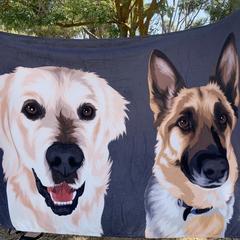
Only a few dogs have a specific sleeping characteristic called crying or whimpering. In this study, we will explore the peculiar occurrence of sleeping dogs sobbing and various physiological, psychological, and evolutionary causes that could be at play.
Dog’s Sleep Cycle
1. The Stages of Dog Sleep
-
Non-REM sleep:
The dog's sleep cycle consists of two main phases: REM sleep and NREM sleep. When dogs go into a deep sleep called non-REM sleep, their muscles relax, and their brain activity slows down. Because of the way that it assists the body with renewing energy that was consumed while conscious, this stage is fundamental for actual recovery.
-
Deep Sleep:
A dog's brain activity significantly increases during REM sleep, the second sleep cycle phase. The rapid eye movements, unpredictable breathing, and twitching paw and facial muscles may be signs that dogs are now going through terrible nightmares. Dogs may bark, cry, or even start to walk when they are in REM slumber.
2. Duration and Frequency of Sleep
-
Average Sleep Time by Age and Race:
A dog's amount of sleep might vary depending on its age, breed, and overall health. Senior dogs may require as much as 14 to 16 hours of sleep per day, compared to puppies, which often need 18 to 20 hours. Compared to pups and older dogs, adult dogs frequently sleep less. Generally speaking, smaller breeds sleep more than larger breeds; however, there are usually exceptions.
-
How You Sleep:
Regular pauses throughout the day, or polyphasic rest, are a habit among dogs. Dogs have more flexible sleeping cycles than people who typically sleep most of the day. Due to their nocturnal behaviour, which may affect their sleep cycle, they are crepuscular species frequently active at dawn and dusk.
3. Factors Influencing Dog Sleep
-
Environmental Factors:
Dogs' resting environments significantly impact their sleep quality. Due to factors including noise, temperature, and illumination, dogs could have trouble falling asleep at night.
-
Physical and mental stimulation:
A dog's sleep pattern may be affected by how much physical and mental stimulation it receives during the day. Regular exercise and mental stimulation can improve sleep-wake cycles.
-
Health and nutrition:
The amount of food a dog consumes, and their general health may directly affect how much they sleep. A dog's ability to get a good night's sleep and enough rest may be affected by digestive discomfort, pain, or other underlying health issues.
Why do dogs cry in their sleep?
1. Sleep Patterns in Dogs:
Understanding why dogs cry while they sleep requires examining how dogs sleep. NREM (non-rapid eye movement) and REM (rapid eye movement) sleep, as well as other sleep phases, are all experiences by dogs, just like in humans. During REM sleep, known for vivid dreams, dogs exhibit heightened brain activity, fast eye movements, and muscular paralysis. This stage is said to be similar to when people dream.
2. Emotional Processing in Dogs:
Dogs are highly sociable creatures that experience various emotions similar to those of humans. According to studies, dogs may experience joy, terror, stress, and sympathy. Dogs' emotional experiences while awake may be processed and relieved while sleeping. This emotional processing may show as vocalisations such as sobbing, whimpering, or crying. Due to anxiety, worry, or other problems when awake, dogs may scream while sleeping.
3. Dream Content and Recall:
Although we cannot directly learn about their imaginations, we can draw educated conclusions based on their behaviour. Owners of dogs have observed their animals acting in ways reminiscent of various dream scenarios, such as running, yelping, or swinging their tails while dozing. According to these characteristics, dogs may be dreaming about past events. If a dog experiences separation anxiety or a traumatic occurrence while awake, it may whimper or weep as a reaction to the emotional memory being replayed while sleeping.
4. Physiology and Physical Discomfort:
Physiological pain is another reason dogs may scream while sleeping. Dogs can experience various physical afflictions, including wounds, illnesses, and age-related disorders. This soreness might get worse while you're sleeping, making you weep. Dogs with arthritis or joint pain, for example, could whimper or sob while sleeping as they adjust their posture to lessen the pain associated with their ailment.
5. Breed-Specific Factors:
The likelihood of weeping when sleeping may be affected because some dog breeds are considered more noisy than others. Species with higher vocalisation levels, such as terriers and hounds, may engage in these behaviours while asleep. Additionally, brachycephalic breeds of dogs, which have shorter snouts, may have problems breathing as they sleep, which may lead them to produce sounds like whimpering or wailing.
6. Nightmares and Traumatic Experiences:
Dogs like us can experience trauma and nightmares. Several things, such as anxiety, terror, or past painful experiences, might create dreams. Due to post-traumatic stress disorder (PTSD), neglected or abused dogs may experience nighttime sobbing or whimpering due to prior traumas. The dog may snore when he sleeps due to the emotional responses that these nightmares and horrible memories may bring about.
7. Seeking Comfort and Attention:
To wake or console their owners, dogs may occasionally scream while asleep. Dogs are keen observers and genuinely care about their human companions. They could learn that when they cry or whimper. To achieve the same outcome, individuals could thus adopt this behaviour when sleeping.
What Should You Do If Your Dog Cries in Their Sleep?

1. Observe and Assess the Situation:
As soon as your dog is deep asleep, you should pay attention and take a close look at your surroundings. Note the duration, severity, and frequency of your sobbing bouts. If they have dreams, you will likely hear the dog sigh while they sleep. There can be a problem if the sobbing continues for a long time, is loud, or is accompanied by unsettling behaviours.
2. Rule Out Physical Discomfort or Pain:
There may be physical pain or suffering behind your dog's nighttime wailing. Ensure your dog is healthy and has no ailments, wounds, or suffering that might worsen while sleeping. Any warning symptoms listed above, including limping, difficulty moving, sensitivity to touch, and changes in appetite or behaviour, should be monitored. Obtain veterinary aid if you notice any concerning medical symptoms so that you can address the underlying medical condition.
3. Establish a happy dosing climate:
Dogs can profit from an open resting space like people. Ensure your dog has a calm, agreeable spot to relax without being upset. Take a look at your bed to ensure it has excellent cushioning. To establish a serene climate that empowers unwinding, think about utilising repetitive sound calming music. Establishing a calm resting atmosphere can lessen your dog’s pressure and uneasiness and may try and work on your dog’s rest. Assess your close-to-home well-being and conduct.
4. Ensures safety and comfort:
If your dog is wailing in his sleep, you can help calm him down by reassuring him. If your dog starts to cry, gently approach, pet, or tell him you're there by saying something kind. It can scare or confuse a sleeping child to surprise them. Instead, let it relax you and naturally wake you up. Your dog may occasionally fall asleep under your soft touch or voice.
5. Talk to an expert:
You should seek professional assistance if your dog's snoring continues or worsens while sleeping. A prepared creature behaviourist or veterinarian can give significant counsel. They will examine your dog thoroughly, evaluate his behaviour and sleep, and recommend the best action. They might encourage evolving conduct, overseeing prescription (if necessary), or getting more tests to uncover the fundamental issue.
Frequently Asked Questions
Do dogs have nightmares?
Yes, It's been observed that dogs occasionally experience nightmares. Dogs share many stages of sleep, including REM (rapid eye movement) sleep, which is connected to dreaming, much like humans do. During rapid eye movement (REM) sleep, dogs may generate vocalisations, limb movements, and other signs of dreaming. These dreams are thought to reflect a variety of situations, some wonderful and others awful. If your dog shows distress while sleeping, you must be ready to comfort and help them. Owners may minimise the frequency and severity of their dog's nightmares by giving them a safe and peaceful place to relax, resolving any underlying emotional issues, and, if necessary, seeking professional assistance.
Can dogs remember their dreams when they wake up?
According to data, dogs may remember particular details or even emotionally charged aspects of their dreams when they awaken, even if the mechanics of how they recollect their dreams are still unknown. Dogs have vivid dreams comparable to human dreams while in the REM (rapid eye movement) stage of sleep.
When a dog awakens from a dream, it could behave in ways that point to some degree of dream recall. For instance, they could show indications of bewilderment, agitation, or passion, as if they were trying to get control of their fictitious understanding. Some dogs may act in ways congruent with their dreams, like pursuing or barking at fictitious objects.
What causes dogs to have nightmares?
Many different things might cause nightmares in dogs. The cause of the issue is historical trauma. Abuse, neglect, or any traumatic incident may increase the likelihood of a dog having unsettling nightmares. Traumatic events may come to mind while you're sleeping and cause nightmares by evoking fear, concern, or suffering. Dogs with phobias or anxiety problems, such as separation anxiety, may have more frequent nightmares. They may experience horrible dreams due to underlying mental stress and concern.
Is it normal for dogs to cry often in their sleep?
It is not common knowledge that dogs will weep a lot or all the time while sleeping. While vocalising or weeping occasionally while having a dream may be acceptable, continual sobbing while asleep might indicate more significant issues. It may be a symptom of something more serious, such as pain or disease, local discomfort, nightmares, or a fear of abandonment. It's crucial to pay attention to a dog's behaviour when they weep a lot when sleeping, evaluate their general health, and seek the advice of a veterinarian or licensed animal behaviourist to find and address any underlying concerns.
Should I wake my dog if they are crying in their sleep?
It is not common knowledge that dogs will weep a lot or all the time while sleeping. While vocalising or crying occasionally while having a dream may be acceptable, continual sobbing while asleep might indicate more significant issues. It may be a symptom of something more serious, such as pain or disease, local discomfort, nightmares, or a fear of abandonment. It's crucial to pay attention to a dog's behaviour when they weep a lot when sleeping, evaluate their general health, and seek the advice of a veterinarian or licensed animal behaviourist to find and address any underlying concerns.
How can I help my dog if they have frequent nightmares?
If your dog has horrifying nightmares all the time, there are several things you may do to assist. Create a comfortable and relaxed sleeping space for your dog first. Think about putting on relaxing music, making your bed cosy, and avoiding unnecessary noise and distractions. Create a daily plan to increase your sense of the world being in order. Plan and feel your way through any underlying tension or fear issues. When your dog awakens from a horrible dream, comfort and reassure them, but try not to wake them up too soon. Get more advice and potential treatments from a licensed animal behaviourist or veterinarian if the disturbing nightmares persist.
Conclusion
Extreme handling, dream content, genuine unease, breed-explicit propensities, terrible nightmares, and the need for attention are all possible explanations for the unusual behaviour of resting dogs weeping. Instead of explaining why a particular dog would cry while sleeping definitively, dog owners should concentrate on their pet's overall wellness, including their physical and domestic well-being. A professional animal behaviourist or veterinarian should be consulted if a dog frequently exhibits distressing behaviours while sleeping to rule out any underlying medical issues and provide the necessary care and support. We can guarantee universal government assistance and the happiness of our adorable canine companions by acquiring it and addressing the potential causes of their snoring while asleep.
Reference links:
- https://petkeen.com/why-do-dogs-nibble-on-blankets/
- https://www.trendingbreeds.com/why-dogs-nibble-blankets/
Recommended Articles :
Latest Review on Woof Blankets
To have such a masterpiece by my side every day is a gift for me and my memories with Rex. Thank you WoofBlankets for such an opportunity to recreate his image on a blanket.Lara o’ Miguel US, California

COLLECTION WORTH EVERY PENNY
BEST SELLERS
-
Woofy Single Color Custom Pet Blanket
![Woofy Single Custom Pet Blanket – Woof Blanket]()
- -41%
BlanketsSHOP NOW- Regular price
- from $64.95
- Sale price
- from $64.95
- Regular price
-
$109.95 - Unit price
- per
Sold out -
Exclusive Christmas Custom Pet Blanket
![Exclusive Custom Pet Blanket]()
- -39%
BlanketsSHOP NOW- Regular price
- from $69.95
- Sale price
- from $69.95
- Regular price
-
$114.95 - Unit price
- per
Sold out -
Christmas Custom Pet Blanket
![Christmas Custom Pet Blanket - Custom Dog Blankets]()
- -40%
BlanketsSHOP NOW- Regular price
- from $69.95
- Sale price
- from $69.95
- Regular price
-
$115.95 - Unit price
- per
Sold out -
Watercolor Pet Portraits
![]() SHOP NOW
SHOP NOW- Regular price
- from $59.95
- Sale price
- from $59.95
- Regular price
-
- Unit price
- per
Sold out -
Woofy Christmas Custom Dog Blanket
![Woofy Christmas Custom Dog Blanket]()
- -39%
BlanketsSHOP NOW- Regular price
- from $69.95
- Sale price
- from $69.95
- Regular price
-
$114.95 - Unit price
- per
Sold out -
Modern Pet Owner Portrait
![]()
- -32%
CanvasSHOP NOW- Regular price
- from $84.95
- Sale price
- from $84.95
- Regular price
-
$124.95 - Unit price
- per
Sold out -
Woof Splash Custom Pet Blanket
![Woof Splash Custom Pet Blanket]()
- -39%
BlanketsSHOP NOW- Regular price
- from $69.95
- Sale price
- from $69.95
- Regular price
-
$114.95 - Unit price
- per
Sold out -
The Admiral - Custom Pet Portrait
![The Admiral - Custom Pet Portrait Online]()
- NEW
- -25%
CanvasSHOP NOW- Regular price
- from $59.95
- Sale price
- from $59.95
- Regular price
-
$79.95 - Unit price
- per
Sold out -
Wings of Loyalty - Custom Pet Portrait
![]()
- NEW
CanvasSHOP NOW- Regular price
- from $59.95
- Sale price
- from $59.95
- Regular price
-
- Unit price
- per
Sold out -
Pet Memorial Custom Photo Collage Blanket
![Personalized pet memorial quilt with photos]()
- -41%
BlanketsSHOP NOW- Regular price
- from $64.95
- Sale price
- from $64.95
- Regular price
-
$109.95 - Unit price
- per
Sold out -
Celestial Paws - Custom Pet Portrait
![]() CanvasSHOP NOW
CanvasSHOP NOW- Regular price
- from $59.95
- Sale price
- from $59.95
- Regular price
-
- Unit price
- per
Sold out -
The Loyal Soul - Custom Pet Portrait
![]()
- NEW
SHOP NOW- Regular price
- from $59.95
- Sale price
- from $59.95
- Regular price
-
- Unit price
- per
Sold out -
Cartoonized Pet Portraits (New)
![Cartoonized Pet Custom Portraits Online]()
- -36%
SHOP NOW- Regular price
- from $59.95
- Sale price
- from $59.95
- Regular price
-
$93.95 - Unit price
- per
Sold out -
The French Sailor - Custom Pet Portrait
![]()
- -25%
CanvasSHOP NOW- Regular price
- from $59.95
- Sale price
- from $59.95
- Regular price
-
$79.95 - Unit price
- per
Sold out -
The Policeman - Custom Pet Portrait
![]()
- NEW
- -25%
CanvasSHOP NOW- Regular price
- from $59.95
- Sale price
- from $59.95
- Regular price
-
$79.95 - Unit price
- per
Sold out -
The General - Custom Pet Portrait
![]()
- NEW
- -25%
CanvasSHOP NOW- Regular price
- from $59.95
- Sale price
- from $59.95
- Regular price
-
$79.95 - Unit price
- per
Sold out -
Woof Love Custom Pet Blanket
![Woof Love Custom Pet Blanket]()
- -39%
BlanketsSHOP NOW- Regular price
- from $69.95
- Sale price
- from $69.95
- Regular price
-
$114.95 - Unit price
- per
Sold out -
Summer Time Custom Pet Blanket
![Summer Time Custom Pet Blanket]()
- -39%
BlanketsSHOP NOW- Regular price
- from $69.95
- Sale price
- from $69.95
- Regular price
-
$114.95 - Unit price
- per
Sold out -
The Ambassador - Custom Pet Portrait
![The Ambassador - Custom Pet Portrait Online]()
- NEW
- -25%
CanvasSHOP NOW- Regular price
- from $59.95
- Sale price
- from $59.95
- Regular price
-
$79.95 - Unit price
- per
Sold out -
Fall In Love Custom Pet Blanket
![Fall In Love Custom Dog Blanket]()
- NEW
- -39%
BlanketsSHOP NOW- Regular price
- from $69.95
- Sale price
- from $69.95
- Regular price
-
$114.95 - Unit price
- per
Sold out -
The Classy Lady - Custom Pet Portrait
![The Classy Lady]()
- NEW
- -25%
CanvasSHOP NOW- Regular price
- from $59.95
- Sale price
- from $59.95
- Regular price
-
$79.95 - Unit price
- per
Sold out -
The Duke - Custom Pet Portrait
![The Duke - Custom Pet Portrait]()
- NEW
- -25%
CanvasSHOP NOW- Regular price
- from $59.95
- Sale price
- from $59.95
- Regular price
-
$79.95 - Unit price
- per
Sold out -
Dog In Suit- Custom Pet Portrait
![Dash Dog In Suit- Custom Pet Portrait Online]()
- NEW
- -25%
CanvasSHOP NOW- Regular price
- from $59.95
- Sale price
- from $59.95
- Regular price
-
$79.95 - Unit price
- per
Sold out -
The Princess - Custom Pet Portrait
![]()
- NEW
- -25%
CanvasSHOP NOW- Regular price
- from $59.95
- Sale price
- from $59.95
- Regular price
-
$79.95 - Unit price
- per
Sold out -
Modern Pet Portrait with One Mug
![Modern Pet Portrait with One Mug]()
- -25%
Print MaterialSHOP NOW- Regular price
- from $99.95
- Sale price
- from $99.95
- Regular price
-
$133.95 - Unit price
- per
Sold out -
The Aristocrat - Custom Pet Portrait
![The Aristocrat - Custom Pet Portrait At Best Price]()
- NEW
- -25%
CanvasSHOP NOW- Regular price
- from $59.95
- Sale price
- from $59.95
- Regular price
-
$79.95 - Unit price
- per
Sold out -
Single Color Custom Blanket with 1 Mug
![Single Color Custom Blanket with 1 Mug]() BlanketsSHOP NOW
BlanketsSHOP NOW- Regular price
- from $99.95
- Sale price
- from $99.95
- Regular price
-
- Unit price
- per
Sold out -
Single Color Custom Blanket with 2 Pillows
![Single Color Custom Pet Blanket with 2 Pillows]()
- -21%
BlanketsSHOP NOW- Regular price
- from $99.95
- Sale price
- from $99.95
- Regular price
-
$125.95 - Unit price
- per
Sold out -
The Dog in Suit Custom Pet Mug
![]()
- -20%
MugsSHOP NOW- Regular price
- $39.95
- Sale price
- $39.95
- Regular price
-
$49.95 - Unit price
- per
Sold out -
Angel Custom Pet Mug
![]()
- -20%
MugsSHOP NOW- Regular price
- $39.95
- Sale price
- $39.95
- Regular price
-
$49.95 - Unit price
- per
Sold out -
This Human Belongs To - Custom Pet Mug
![]()
- NEW
- -20%
MugsSHOP NOW- Regular price
- $39.95
- Sale price
- $39.95
- Regular price
-
$49.95 - Unit price
- per
Sold out -
It's Not Dog Hair Custom Pet Mug
![]()
- NEW
- -20%
MugsSHOP NOW- Regular price
- $39.95
- Sale price
- $39.95
- Regular price
-
$49.95 - Unit price
- per
Sold out -
My Dog Is My Valentine Custom Pet Mug
![]()
- NEW
- -20%
MugsSHOP NOW- Regular price
- $39.95
- Sale price
- $39.95
- Regular price
-
$49.95 - Unit price
- per
Sold out -
3 Photos With Message Custom Pet Mug
![]()
- NEW
- -20%
MugsSHOP NOW- Regular price
- $39.95
- Sale price
- $39.95
- Regular price
-
$49.95 - Unit price
- per
Sold out -
My Valentine Has Four Legs- Personalized Mugs
![]()
- NEW
- -20%
MugsSHOP NOW- Regular price
- $39.95
- Sale price
- $39.95
- Regular price
-
$49.95 - Unit price
- per
Sold out -
Dog Mamma Custom Pet Coffee Mug
![]()
- -20%
MugsSHOP NOW- Regular price
- $39.95
- Sale price
- $39.95
- Regular price
-
$49.95 - Unit price
- per
Sold out -
Uncle Sam - Custom Pet Portrait
![]()
- NEW
- -25%
CanvasSHOP NOW- Regular price
- from $59.95
- Sale price
- from $59.95
- Regular price
-
$79.95 - Unit price
- per
Sold out -
The Revolutionary Emperor - Custom Pet Portrait
![]()
- NEW
- -25%
CanvasSHOP NOW- Regular price
- from $59.95
- Sale price
- from $59.95
- Regular price
-
$79.95 - Unit price
- per
Sold out -
The Princess Paws - Custom Pet Portrait
![]()
- -25%
CanvasSHOP NOW- Regular price
- from $59.95
- Sale price
- from $59.95
- Regular price
-
$79.95 - Unit price
- per
Sold out -
The Dark Crusader Knight - Custom Pet Portrait
![]()
- -25%
CanvasSHOP NOW- Regular price
- from $59.95
- Sale price
- from $59.95
- Regular price
-
$79.95 - Unit price
- per
Sold out































































